How to write a consulting resume that passes the screening phase?
Top-tier consulting firms receive thousands of applications per year.
And only 30% of those applications pass the screening phase.
The other 70%?
They go to the rejection pile.
And weeks of intense preparation and years of effort are wasted.
So, here is my promise:
If you read this guide, this won’t be you!
In this in-depth guide, you’ll learn:
- What matters for consulting firms
- How to stand out (Hint: by writing EPIC bullet points)
- Which mistakes lead to rejection (and how to avoid them)
And here is the best part:
This article also includes the following:
- A simple step-by-step guide to writing a perfect management consulting resume
- Consulting resume templates you can download
- Three consulting resume examples that work in 2023
- A checklist to assess the readiness of your document
So if you want to apply to top-tier consulting firms, this guide is for you.
Let’s dive right in!
Table of Contents
Get the latest data about salaries in consulting
The screening criteria: what recruiters want
There are many ways to answer this question.
For instance, recruiters want to know if you won’t make them lose their time.
In other words:
They don’t like to invite you for an interview and see that you can not a good fit.
And from that perspective, recruiters are very risk-averse.
If they have any doubt that you are not a good fit, they’ll reject your application.
An example?
Does your resume have a typo?
If yes 👉 rejected.
(maybe you’ll make typos while making a presentation to a client.)
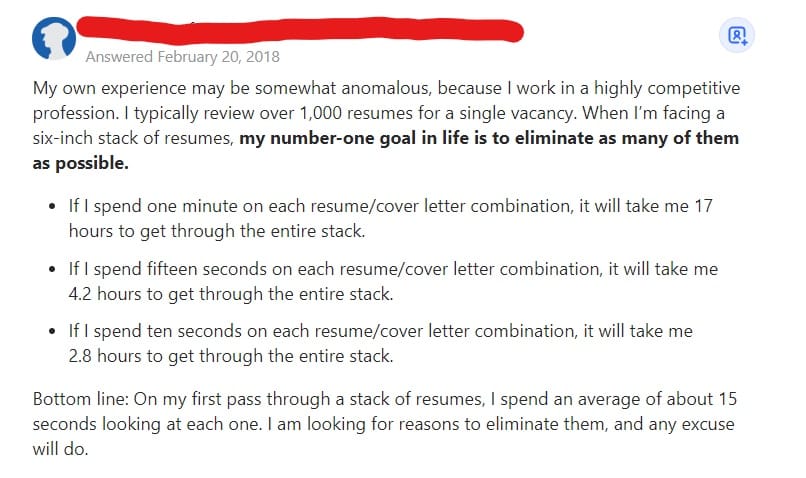
Another way to answer this question is:
Recruiters want to know if you can become a management consultant.
In other words:
They want to know if you possess the characteristics of a successful consultant.
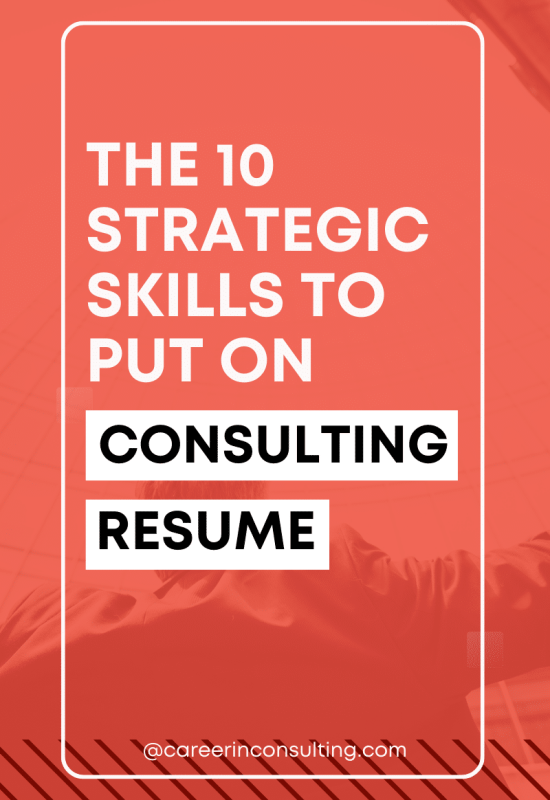
Those characteristics and skills for your consulting resume are:
- Academic excellence
- Problem Solving
- Teamwork
- Analytical and quantitative skills
- Drive
- Leadership
- Capacity to influence
- Communication skills
- Results Orientation
- Clients Orientation.
The exact terminology can change depending on the firm.
But, all strategy consulting firms look for the same characteristics.
And if you want to become a management consultant, you must have those characteristics.
Now, let’s define the consulting resume skills sought by consultancies:
Academic excellence
Recruiters will assess the following:
- The reputation of your college
- Your GPA
- The awards you earned. For instance, being on the Dean’s list
- Your scores on standardized tests like GMAT.
Problem Solving
Recruiters will assess your capacity to address complex challenges, develop practical solutions, and navigate ambiguity.
Problem-solving requires logical reasoning and the ability to use both quantitative and qualitative analysis to reach solutions.
Teamwork
Recruiters will assess your capacity to work effectively with others to achieve a common goal, respect diverse perspectives, collaborate productively, and contribute positively to the team dynamic.
Drive
- Your working environment: have you worked in intense work environments like consulting, investment banking, or a startup/scaleup environment?
- The progression of your career (have you been promoted faster than your peers?)
- Your involvement in activities outside of school or work
Leadership
Recruiters will assess the following:
- Whether you had/have leadership roles at work, in clubs, or organizations
- Exposure to working with people
- Experience in working with different stakeholders/functions (which is a big part of the day-to-day job of a management consultant).
Capacity to influence
Recruiters will assess your experience in making others act upon your recommendations.
That’s what McKinsey calls personal impact.
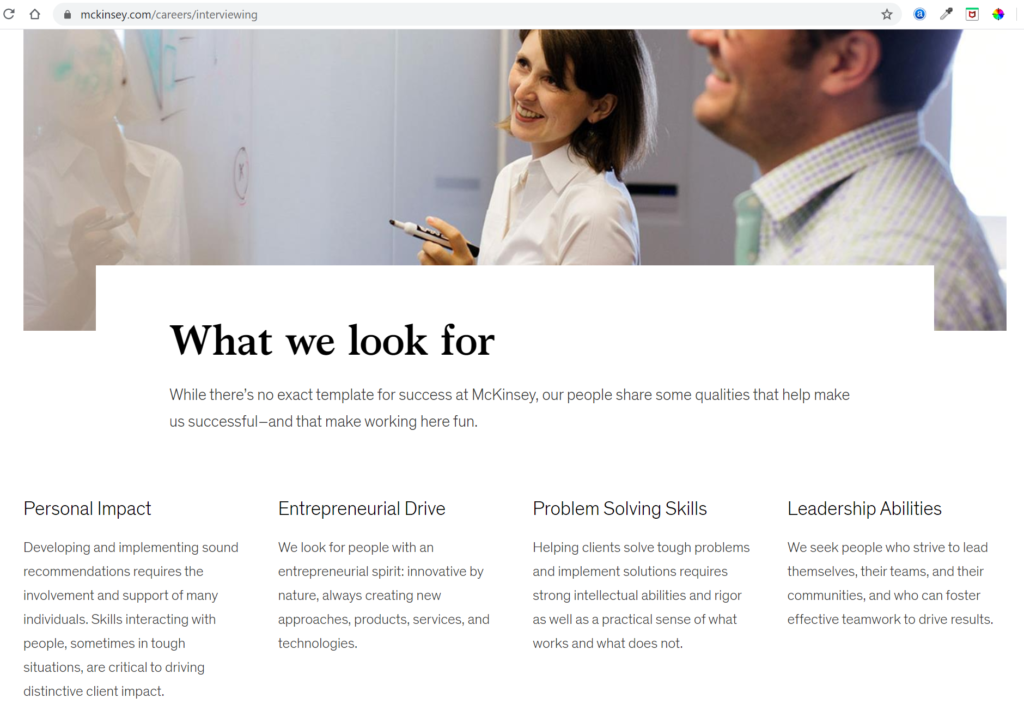
Management consultants are change agents.
Thus, consulting firms want to assess if you can be a change agent too.
Communication skills
Recruiters will assess your capability to convey information clearly and effectively through both written and verbal means.
In consulting, this includes the ability to present complex ideas in a straightforward manner and effectively engage with clients and team members.
Quantitative and analytical skills
- The major of your degree (math, physics, finance, etc.)
- Your work experience: does it involve heavy quantitative work? (for example, banking, finance, consulting, marketing, private equity, etc.)
- If you have experience in quantitative work (modeling, data analysis, etc.)
Results orientation
Recruiters will assess your experience in making quantifiable contributions.
That’s what Bain & Company calls Results delivery.
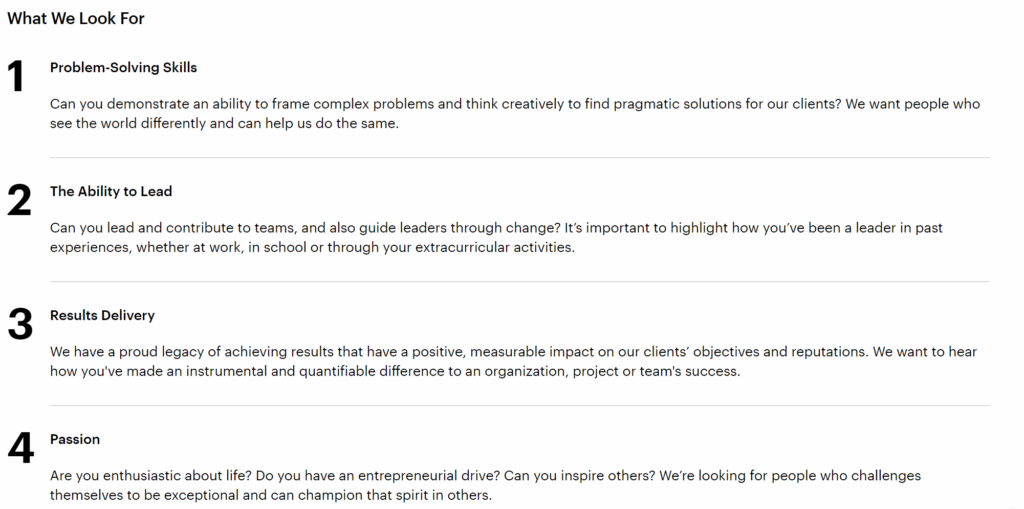
Clients orientation
Recruiters will assess your capacity to understand and meet clients’ needs, including building strong relationships, adapting solutions to client contexts, and ensuring client satisfaction.
This skill is critical in consulting due to the client-centered nature of the work.
Must you have all these characteristics?
Short answer: no.
If you have all the above characteristics, it helps.
But you don’t have to.
If one (or two) of these characteristics is average, consulting firms can still invite you for interviews.
Related articles:
Your answer to the question Tell me about yourself must be consistent with the information on your resume.
Check this article explaining how to craft a superior answer to the question “Tell me about yourself.”
Also, read this article to learn more about the recruiting process at McKinsey.
Besides, I’ve written articles about the recruiting process at Boston Consulting Group and Bain & Company.
The 6 sections in a consulting resume
First, let’s start with the mandatory sections all resumes must have.
All consulting resumes should include the following four mandatory sections:
- Contact
- Education
- Work experience
- Other information
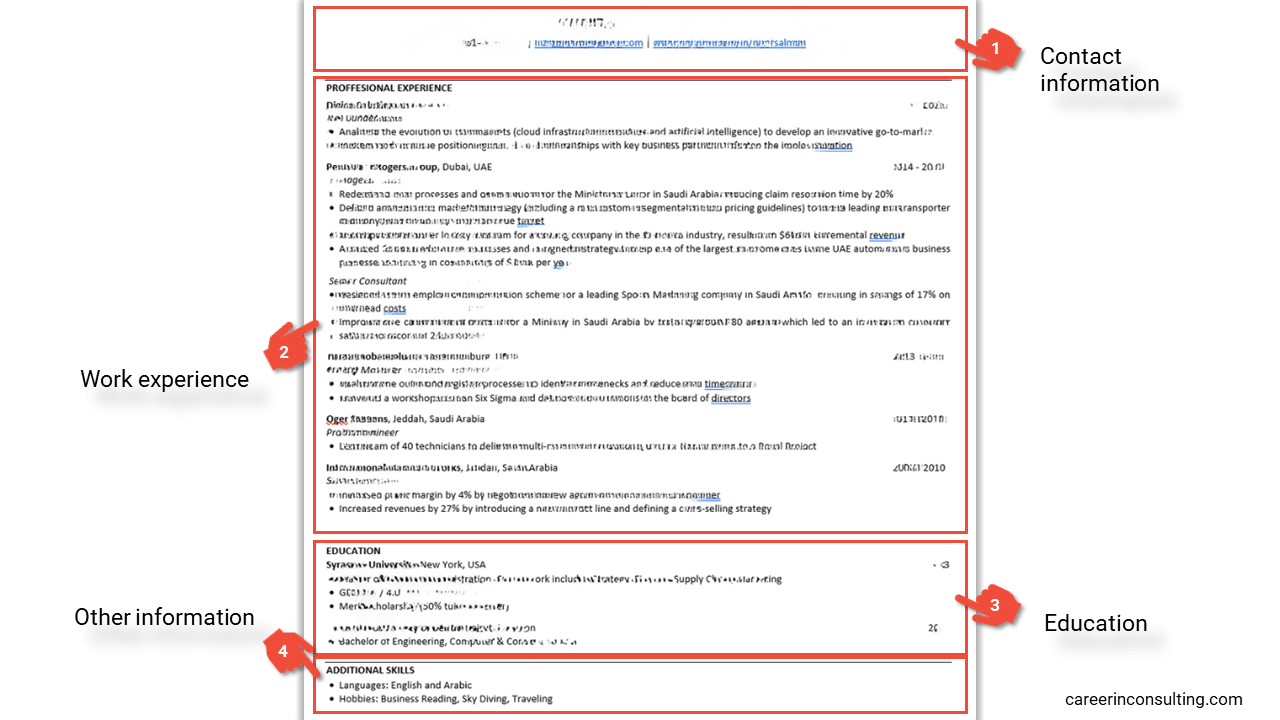
These sections provide consulting firms with an overview of your achievements and academic background.
Each part is essential and influences your chances of being considered for an interview.
Contact section (mandatory)
The contact section should be at the top of your consulting resume.
It should include the following information:
- First name
- Last name
- Email address
- Phone number.
Important: make it easy for the recruiters to know how to contact you!
Also, you can include a link to your LinkedIn profile.
However, I don’t recommend including your home address (unless asked by the office you’re applying to).
Education section (mandatory)
- Names of colleges or universities you attended
- Degrees you completed
- Honors you earned
- Starting and ending dates.

Work Experience section (mandatory)
The Professional Experience section should include your previous positions (in an anti-chronological order).
Also, you’ll add your main achievements in each of these positions.
Things to include in your management consulting resume:
- Employer’s name
- Position / Title
- Date and location
- Achievements
Things to exclude (unless requested by the firm you applied to):
- Summer jobs such as waiter, etc. (it’s irrelevant)
- Jargon (to avoid at all costs)
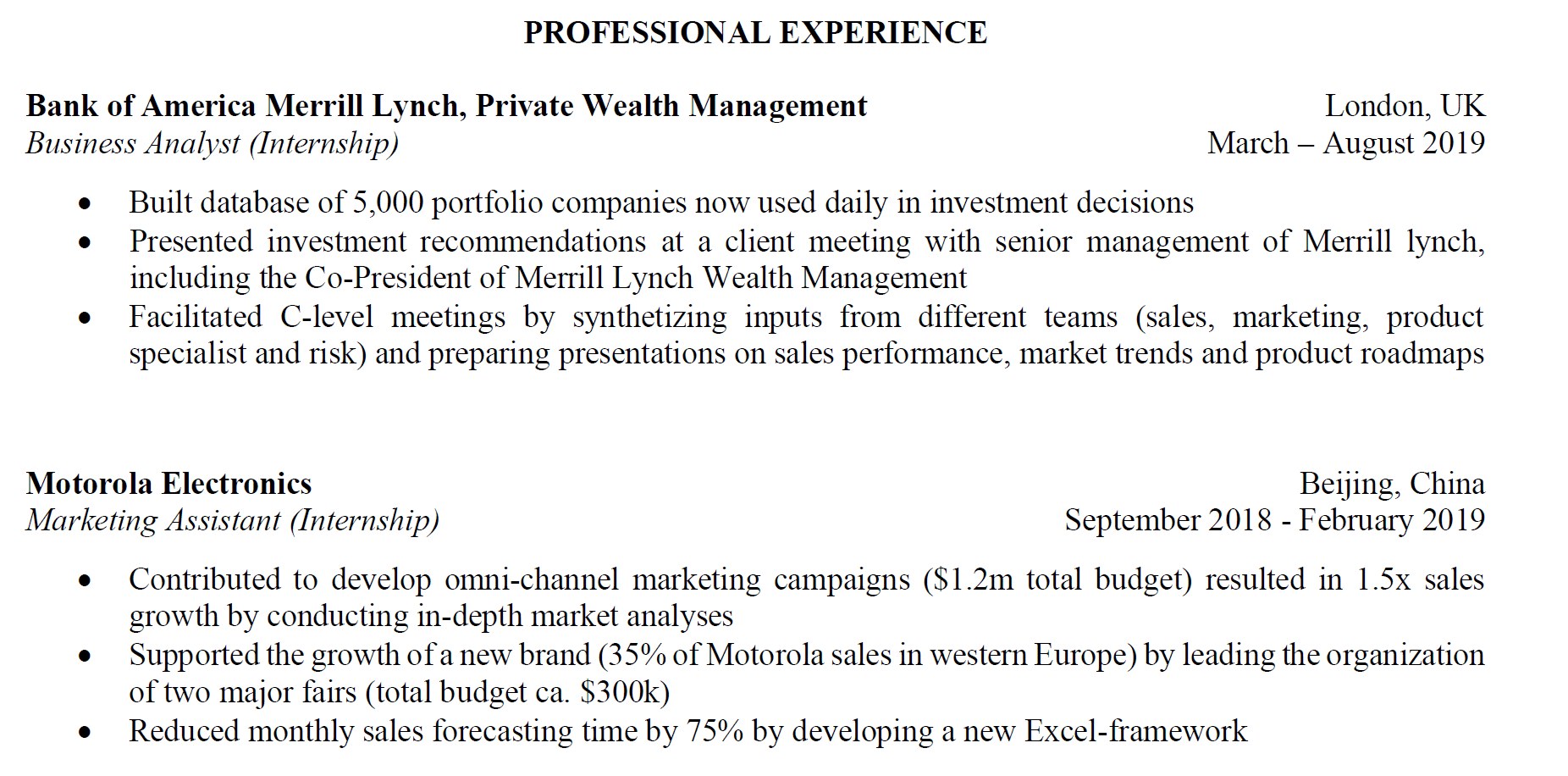
Other information section (mandatory)
This section may include the languages you speak.
Do you speak more than one language?
Say it.
The more languages you speak, the better your chances.
Besides, you want to mention your hobbies.
While you don’t want to include a long list of hobbies, consulting firms want to get to know you personally.
They want to see what you do outside of work.
But let’s be blunt:
Even the most impressive hobbies are not deal-makers.
In other words:
You might have climbed the Everest.
Yet, you’ll never be invited for an interview if your academic and professional achievements are below their expectations.

Your resume can also stand out from the competition by including optional sections like your profile summary and leadership experiences.
Career summary section (optional)
This section should condense your resume into three or four sentences.
The purpose?
Entice the readers to continue reading the other sections.
Note: the step-by-step guide below includes a framework for writing captivating profile summaries.
Leadership skills section (optional)
Have you had a leadership experience in an association?
Or have you been the president of a club while at college?
Then, mention it in this section.
However:
You must turn these experiences into achievements.
How to organize your consulting resume sections
Now, in which order should you organize all these sections?
You have two options.
And you should choose one option or the other based on your situation.
Option 1: if you are still a student.
In this situation, the order of the different sections must be as follows:
- Contact information
- Career summary (optional)
- Education
- Work experience
- Leadership experience (optional)
- Other information.
Option 2: if you are not a student.
In this situation, the order of the different sections must be as follows:
- Contact information
- Career summary (optional)
- Work experience
- Leadership experience (optional)
- Education
- Other information.
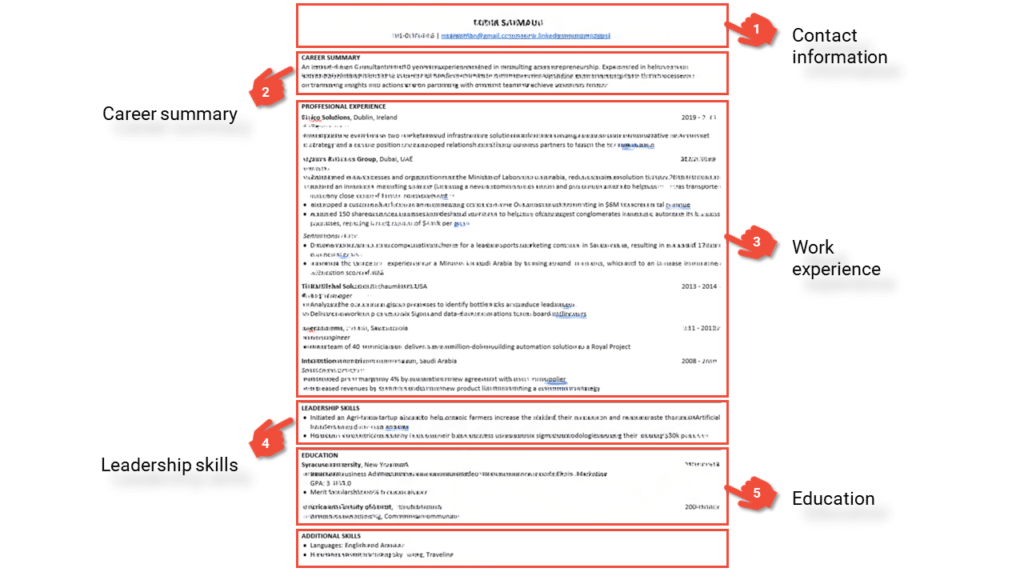
How to write a consulting resume: your step-by-step guide
Let’s talk about your management resume guide to get multiple offers.
Here are the 11 essential steps to writing a strategy consulting resume.
Before walking you through these steps, please watch this video to craft a superior consulting resume:
Step 1: Choose a suitable template
First and foremost, you must choose the format of your resume.
There are two types of resume formats: chronological and functional.
A chronological resume shows your work history in reverse chronological (the most recent first).
On the other hand, a functional resume (also called a skills-based resume) highlights skills and qualities.
For consulting applications, the classic prevails.
Therefore, you must have a traditional chronological resume.
And the style must be classic too.
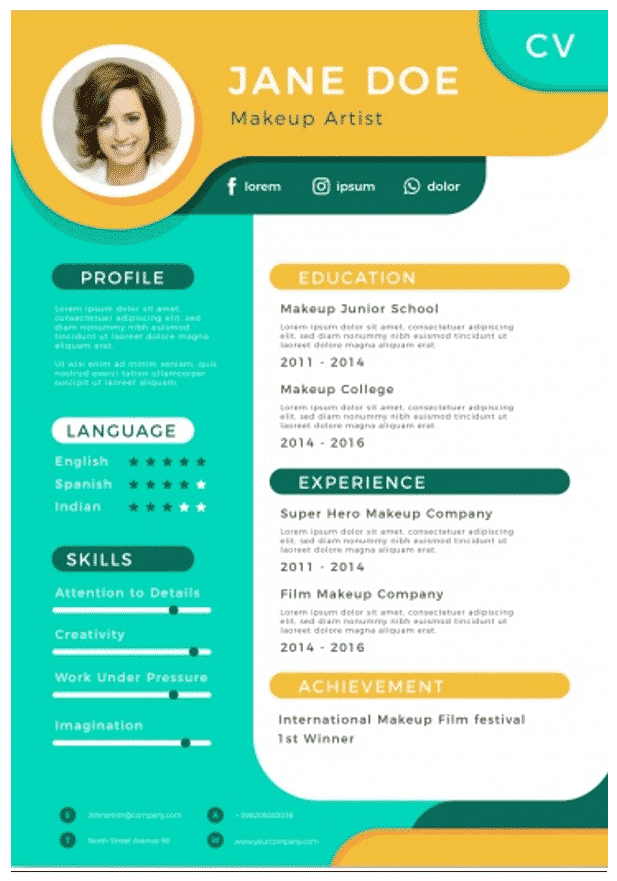
Don’t be creative!
You want to stand out with substance rather than with style!
Step 2: Add your contact information
In this section, you should include your personal details.
Things to include in your management consulting resume:
- Full name
- Contact information: email and phone number
Things to exclude (unless requested by the firm you applied to):
- Photo
- Date of birth
- Postal address
Note: your email address should look professional.

Step 3: Update the Education section
You are competing with some candidates having exceptional academic credentials.
Here is a list of 7 ways to stand out in the EDUCATION section of your consulting resume:
- Ranking of your school: was your school ranked as a top university? The ranking is important, mainly if you apply abroad.
- Curriculum: have you focused on quantitative topics such as Math, Physics, Economics, Finance, Marketing, etc.?
- GPA: have you done better than other students? Have you graduated at the top of your class? If yes, which percentile?
- Standardized tests (i.e., GMAT, GRE, LSAT): have you performed well in a standardized test?
- Scholarship: Have you received a scholarship? How much? What % of the total fees? What % of your class received a scholarship?
- Awards: Have you received an award or a price such as being on the Dean’s list? Have you received any distinction?
- Leadership: Have you contributed positively to other students’ lives? Have you taken any initiative for the greater good? Have other students elected you to run a club or an association?
Besides, you can watch the video below, an extract of a workshop I gave at a University.
Step 4: List all your work experiences and achievements
Your business consulting resume must show how you moved the needle.
And to do so, there are two things you need to do:
- List all the situations where you had an impact
- Prioritize the situations that will appear on your resume
Let’s start with the first step:
Brainstorm: list all the situations where you had an impact
Start by listing all the situations – from your work experience, from school or from your extra-curricular activities – where you had an impact.
In other words, think where you moved the needle, or where you have been remarkable, or where people noticed your accomplishments, etc.
At this stage, you are in brainstorming mode, so:
- List everything out as it comes to you, and the filtering will come next; do not apply any judgment or filtering during this process
- Outline statements in the form of notes; you will refine them and turn them into powerful achievements later
You can use the following questions to help you list the accomplishments that may end up in your resume.
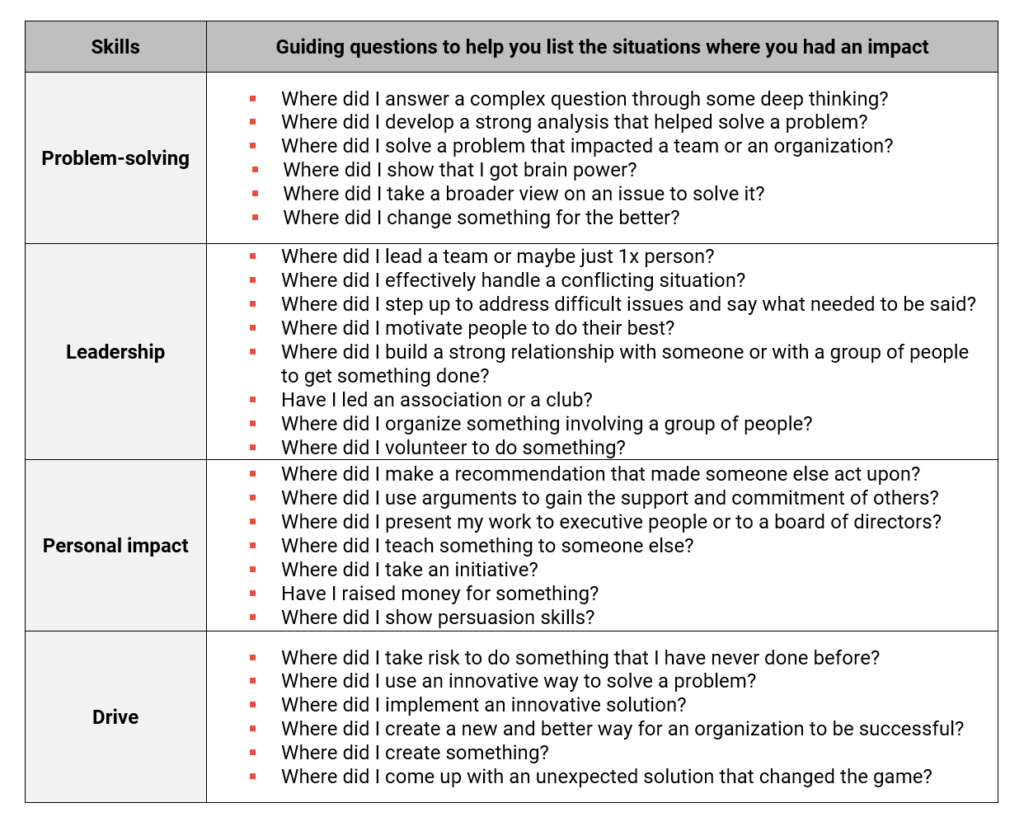
This is not an easy exercise.
Hence, do this exercise several times.
For instance, after doing it once, update your list of achievements the next day after a good night of sleep.
Then, rinse and repeat between 3 and 5 times.
Prioritize: select your most impressive achievements
Now you have a list of situations where you had an impact.
But you can’t put them all in your management consulting resume.
Thus, you must select some of them that will become the achievements in your CV.
So, how much should you select?
I recommend using this simple rule (based on the less is more principle):
- Select a maximum of four achievements per position for the most recent job positions (less than five years)
- Two achievements per position are enough for the oldest job positions
Get 4 Complete Case Interview Courses For Free

You need 4 skills to be successful in all case interviews: Case Structuring, Case Leadership, Case Analytics, and Communication. Join this free training and learn how to ace ANY case questions.
Step 5: Write EPIC bullet points
Now that you have a prioritized list of situations where you had an impact, it’s time to translate them into compelling business stories.
These stories must tell:
- Which problems you had to solved
- How you solved those problems
- Which impacts resulted from your actions
You want to show the readers how GREAT you are and the HUGE opportunity they would miss by NOT inviting you.
To do so, use the PAR framework (this is one of my favorite hacks) to tell the readers the IMPACT you had:
– [P] Problem: what PROBLEM did you have to solve?
– [A] Action: what ACTION did you take to resolve the problem?
– [R] Results: what was the RESULT of your action?
Not only will the PAR framework help you craft a great resume, but also it will help you prepare for your job interviews.
The problem you solved
Describe the problem you had to solve: what was the problem?
The secret to describing a problem is to think of the problem from the point of view of your company:
Why was this problem important to solve for your employer? What would have happened if you had not resolved the problem?
In addition to these questions, ask yourself:
- How big was this problem: which metric was impacted? By how much?
- What was the scale of the problem: how many product lines / geographies / teams / etc. have been impacted? How many people / teams were involved in the problem resolution process?
- Which were the challenges you faced: did you have to resolve this problem within a tight timeframe? With limited resources?
Your actions to solve the problem
Tell what you did and the skill that enabled you to solve the problem.
The key here is to be specific: even if you have used several skills to solve the problem (and you probably did), focus only on one skill.
To help you write the actions you did, you can use this list of consulting resume keywords.
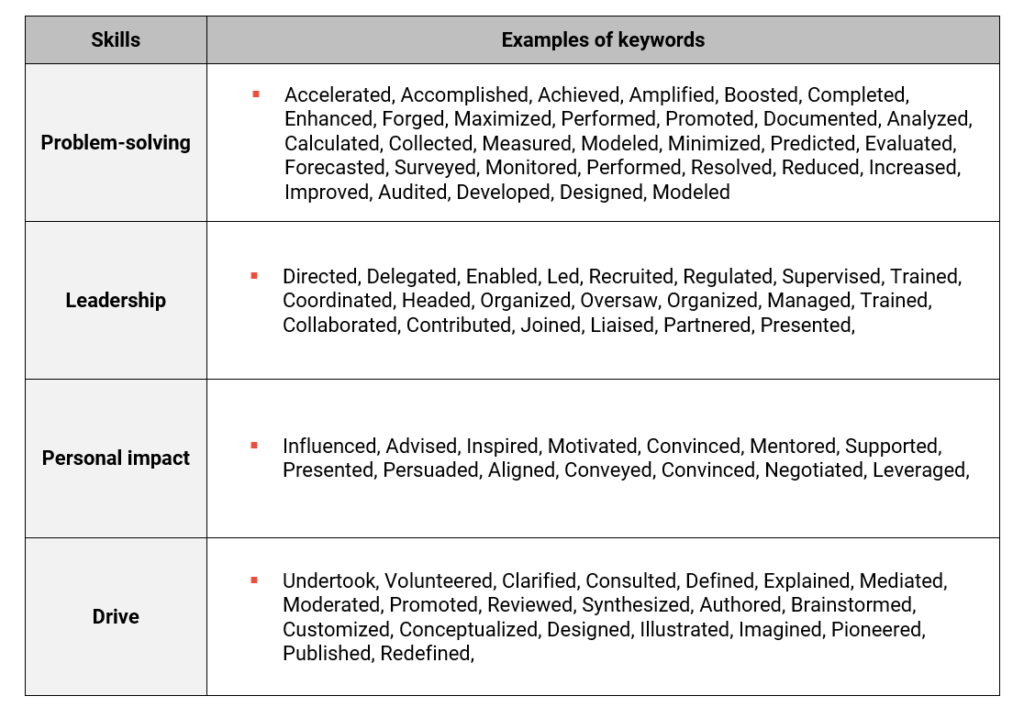
The result of your actions
Show the impact of your action.
The key here is to quantify your contributions.
For instance:
- Have you increased profits?
- Have you increased sales?
- Have you saved money?
- Have you increased productivity?
- Have you implemented a solution faster than expected? Or below budget?
- Have you made someone else’s job easier?
- Have you gained new customers?
- Have you increased customer’s satisfaction?
- Have you lowered customer churn?
- Have you improved a specific metric?
In addition, mention over what timeframe did you get these results.
For instance: “Increased customer satisfaction rate by 15% within 3 months.”
You must quantify the results of your actions.
It shows that you are result-oriented and comfortable with numbers.
20 examples of killer bullet points
Analytical skills:
- Analyzed a dataset of over 1 million customer interactions to identify key trends and recommended process adjustments that reduced operational costs by 15% within six months
- Designed and implemented a complex financial model to forecast the impacts of price changes on revenue, leading to an optimized pricing strategy that increased profits by 18% year-over-year.
- Resolved a long-standing issue with supply chain inefficiency by identifying key bottlenecks and implementing a real-time inventory management system that reduced delivery times by 33%.
- Led a task force to resolve a persistent quality control issue, devising a novel testing protocol that decreased defective product rates by 25% and saved the company $500,000 annually.
- Managed a team of 10 consultants in a high-profile market entry strategy project, guiding the client to expand into three new countries, resulting in a 20% increase in market share over two years.
- Directed a regional sales team through a critical turnaround strategy, reversing a two-year decline in sales and achieving a 10% growth in annual revenue within the first year of leadership
- Developed and presented monthly performance reports to senior management and stakeholders, enhancing the strategic decision-making process by providing clear insights and actionable recommendations.
- Authored a comprehensive training manual adopted across the company, which standardized procedures and improved training efficiency by 25%, enhancing overall operational readiness.
- Collaborated with cross-functional teams, including tech, marketing, and operations, to streamline the product launch process, reducing time-to-market by 30% and improving team satisfaction scores by 40%
- Partnered with software engineers and data scientists to develop a new analytics tool that improved data accuracy by 40%, enhancing the decision-making process across the business unit.
- Cultivated a client partnership that led to the firm securing a three-year service contract worth $3M, by consistently exceeding key performance indicators and delivering exceptional service quality
- Successfully managed client expectations and project deliverables in a complex IT overhaul, resulting in a 95% client satisfaction rate and subsequent referrals that generated additional business.
- Persisted in securing a pivotal client relationship amidst intense competition and initially unfavorable client sentiment, ultimately achieving a strategic turnaround that contributed to a 50% increase in the client’s investment
- Overcame significant project delays due to unforeseen regulatory changes, adapting project scope and timelines to meet new requirements while still delivering under budget and ahead of revised schedules
- Initiated and led a new digital transformation project that introduced AI-driven analytics to the firm’s service offerings, capturing a new market segment and increasing department revenue by 35%.
- Pioneered a market research initiative into emerging technologies, leading to the development of a new product line that captured an early mover advantage and resulted in a 20% revenue increase in its first year.
Step 6: Check the well-roundness of your profile
Now that you have EPIC bullet points, it’s time to check the well-roundness of your profile.
What does that mean?
It means you want to show you have ALL the consulting skills.
Or as many as possible.
Why is it important?
Because I see this mistake all the time:
Candidates with resumes showing only one skill.
For instance, the resume of an Engineer can only highlight their excellent analytical skills.
And waste an opportunity to show they have other consulting skills.
Like leadership, drive, or persuasion skills.
Don’t make the same mistake.
Step 7: Write the Executive Summary section
Just as the purpose of an advertisement is to get people to buy, a Career Summary is your opportunity to hook the reader’s interest and make him/her eager to scan further down the page.
However, this section shouldn’t take up more than four or five lines.
Otherwise, you’ll risk losing the recruiter before they move on to your professional experience.
The questions you need to ask yourself are:
- What are your core attributes? Dedicated, results-driven, and enthusiastic. [Note: check the Personal Attributes table below to help you answer this question]
- Who are you? A financial analyst.
- What is your experience, past and present? 4 years of investment banking experience.
- What are your core skills? Highly quantitative.
- What are your areas of expertise? Working with small corporates with revenues of up to €50m per annum.
- What have you achieved, or in which areas do you excel? Developing client accounts and increasing revenue.
- What do you enjoy doing? Team leading, client contact.
For instance:
A dedicated Financial Analyst with 4 years of experience gained working for two of the UK’s leading investment banks. Experienced with managing and developing a portfolio of small corporate accounts with an annual turnover of €50m, positively impacting bottom-line profitability. Thrives on providing exemplary levels of customer service and managing small teams. Enthusiastic and results-driven with an innate ability to pay close attention to detail.
This is one of the toughest sections of the management consulting resume to write.
Because you only have a few sentences to highlight the most important attributes you think will catch the recruiter’s attention.
List of personal attributes
Able Dependable Innovative Punctual Accurate Decisive Intelligent Qualified Adaptable Detail-oriented Inventive Quick-thinking Adventurous Determined Loyal Rational Alert Diligent Mature Realist Ambitious Diplomatic Methodical Reliable Articulate Dynamic Meticulous Reputation Assertive Effective Motivated Resourceful Astute Efficient Multilingual Responsible Attention to detail Empathetic Objective Self-assured Bilingual Energetic Observant Self-confident Bright Enthusiastic Open-minded Self-motivated Calm Expertise Organized Self-reliant Capable Fast-track Outgoing Sensitive, Flexible Passionate Spirited Caring Focused Patient Successful Clarity Friendly People-oriented Supportive Committed Goal-driven Perceptive Talented Competent Persistent Tenacious Confident Hands-on Personable Thorough Conscientious Hardworking Positive attitude Thoughtful Consistent Helpful Presentation Time keeping Co-operative High-energy Principled Trustworthy Creative High-impact Proactive Understanding Cross-functional Honest Productive Versatile Decisive Imaginative Professional Willing Dedicated Independent Proficient
Step 8: Add the other information section
My recommendation here is to keep things simple and to list the foreign languages you master as well as your hobbies.
Things to include:
- Languages you master and your level of proficiency
- Hobbies (try to be original and put signs of success such as running a marathon in less than 4 hours or playing concerts, etc.)
- Certificates
Things to exclude (unless requested by the firm you applied to):
- IT skills such as Excel, PowerPoint, or Word (it’s useless)
Step 9: Proofread and check typos
After you have completed the laborious process of distilling your life’s accomplishments onto a single piece of paper, it’s time to polish your consulting resume to make sure it stands out above the rest.
Your resume is one of the few things you need to be perfect.
Thus, you must put the same attention to detail in your resume as Management Consultants do with their slide deck presentations.
In other words:
Perfection is the minimum standard your management consulting resume must pass to keep it out of the rejection pile.
Pay close attention to the following areas to make your resume bulletproof.
Consistency
A consulting resume demands consistency across every single element on the page.
In other words:
The decisions you make about how you format your resume, from the styles of your headings to your font emphasis, must be consistent throughout the entire document.
For instance, if you use 12-point bold font for company names on your CV, all company names should be formatted the exact same way.
Another example:
If you’re styling your role in italics, then every job title in your resume should also be formatted in italics.
Spelling and grammar
Few things scream “unprofessional” quite as loudly as spelling and grammar errors on a resume.
So pay extra close attention to avoiding these errors at all costs.
You can not make a single error here.
Hence, ask for at least three different people to read your resume.
The company Talent, Inc recently surveyed 379 recruiters and human resource executives and asked them, “What are your biggest resume ‘deal-breakers’ that can cost a candidate the job?”.
They confirmed that spelling and/or grammatical errors could lead to a candidate’s dismissal even before they finish reading the resume.
Here is a list of CV mistakes to avoid.
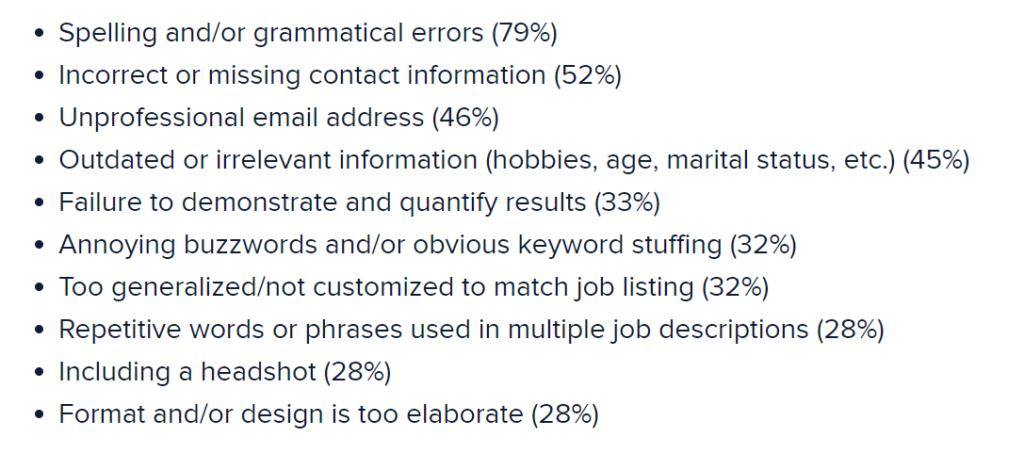
Formatting
Every other formatting and stylistic element should be perfect, including spaces, tabs, line heights, font emphasis, horizontal dividers, margins, bullets, and alignments.
In addition, make sure indents are consistent throughout the resume; you can do this by clicking on the ruler mark at the top of the document (⌂) to show the vertical line of the left and right margins across the screen and see where the text lines up.
File name and type
First, use the PDF format when submitting your resume to a consulting firm unless otherwise specified by the company or recruiter.
Besides, when assigning a file name to your resume, include your first and last name along with the name of the company you’re applying to in the name of the file, like “Sébastien Ritter Resume McKinsey.”
Note: your consulting cover letter must respect the same guidelines about file name and type.
Step 10: Get your CV reviewed by a consulting expert
I cannot blame you if you are struggling to write your management consulting resume:
It can be overwhelming to decide which information to include in your resume.
And to choose which words to use to describe your achievements.
To ensure your consulting resume is great, share it (with this article 😉) with your friends and ask for feedback.
But do not ask all your friends.
Instead, focus on these three people:
- Someone who is a grammar champion,
- An HR person, preferably in the consulting industry),
- And a Management Consultant.
If you need help from a team of experts (including former MBB recruiters), check this page.
Why work with us?
Check these success stories from our clients and learn more about how we achieve an 85% success rate.
Step 11: Complement your resume with a great cover letter
I always recommend submitting a consulting cover letter.
Submit a consulting cover letter even when consulting firms don’t ask to.
My best consulting resume tips
In 2023, I analyzed 147 management consulting resumes.
As a result, here are my 7 best resume tips.
And here is the best part:
You’ll also learn the most common mistakes to avoid at all costs.
Consulting resume tip 1: Meet consulting requirements
McKinsey, BCG, Bain, and other top consulting firms are searching for candidates having consulting skills.
For instance, these consulting skills are problem-solving, leadership, impact on others, entrepreneurship, etc.
You will likely need to modify your standard resume, which you may already use for other jobs, to highlight the particular soft skills consulting firms seek.
If you don’t do this, your CV may be ignored because it isn’t sufficiently tailored to consulting.
Consulting resume tip 2: Simplify your writing
Clarify and condense your message.
Using complicated words and jargon would almost certainly fail to convey your intentions to the company, and the person reading the resume probably won’t bother with the rest of your application.
Consulting resume tip 3: Show how you moved the needle
Make sure to quantify your accomplishments.
If you can demonstrate your actions’ impact, especially at work, your accomplishments will appear more impressive.
Use numbers (e.g., produced 9% year-over-year sales growth and produced £92m in efficiency savings) whenever possible.
Having specific personal information can help you stand out from other applicants.
Consulting resume tip 4: Write for a 20-second scan
Consulting HRs will not spend 10 minutes reading your consulting CV.
Not even 5 minutes.
Instead, they will scan it.
Thus, a good first impression only has less than 20 seconds to make an impact.
To do so, use keywords that HRs are looking for.
Action verbs are a great place to start with.
Each of your sentences needs to begin with an action verb emphasizing a soft skill that top consulting firms are looking for.
For instance, your leadership bullet points should begin like this:
“Led a team of 4 Engineers…”
Another example: your problem-solving bullet point can look like this:
“Solved one of the most challenging productivity problems…”
These action verbs are significant because they come at the beginning of sentences.
The resume screener will say:
“Okay, this person has the right skills,” if you use the proper ones. I’d like to examine their resume in more detail. “.
Consulting resume tip 5: Emphasize big brand names
Ensure the prestigious universities you attended and the prestigious businesses where you worked are prominently mentioned on your resume.
Consulting resume tip 6: Remember that spelling counts
Grammar and spelling mistakes can indicate that you neglected to proofread your own resume.
Additionally, be consistent—do not represent a dash with “—” in one location and “–” in another.
Consulting resume tip 7: Give yourself time to write a quality resume
A strong consulting CV takes time to write, just like consulting cover letters do.
It’s important to consider your accomplishments and what sets you apart from others if you want to be successful.
Think twice before assuming you can create a quality management consulting CV in a single evening.
It necessitates numerous revisions, careful rereading, and prompt feedback.
Additionally, you must ensure that the management consulting CV complements your cover letter flawlessly and elaborates on your impressive abilities and experiences.
Five consulting resume examples that worked
Undergraduate consulting resume example
Here is a first example of a winning McKinsey consulting resume.
This candidate has been invited for interviews and received an offer.
Note: this CV was also a winning BCG consulting resume and Bain consulting resume.
Note 2: I’ve changed some data for anonymization purposes.
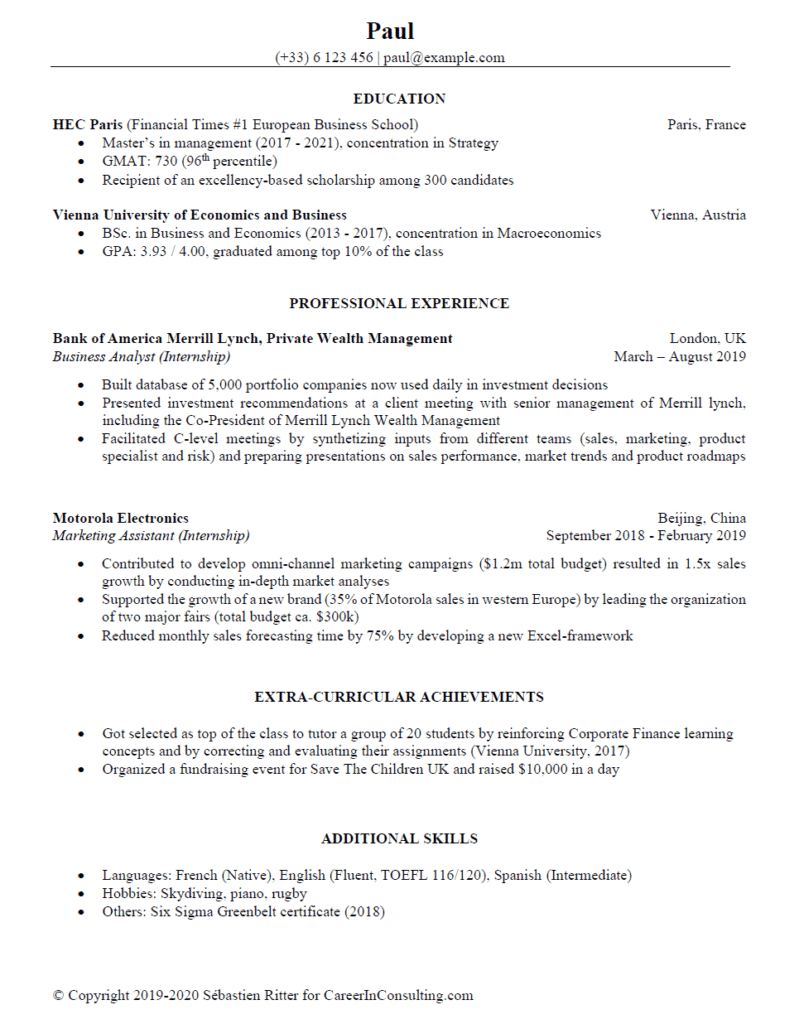
MBA consulting resume example
Consulting firms love hiring MBA students!
But the competition is fierce.
And it can be challenging to stand out from your peers.
Hence, here is an MBA consulting resume example that worked in 2023.
Use this consulting resume example to update yours.
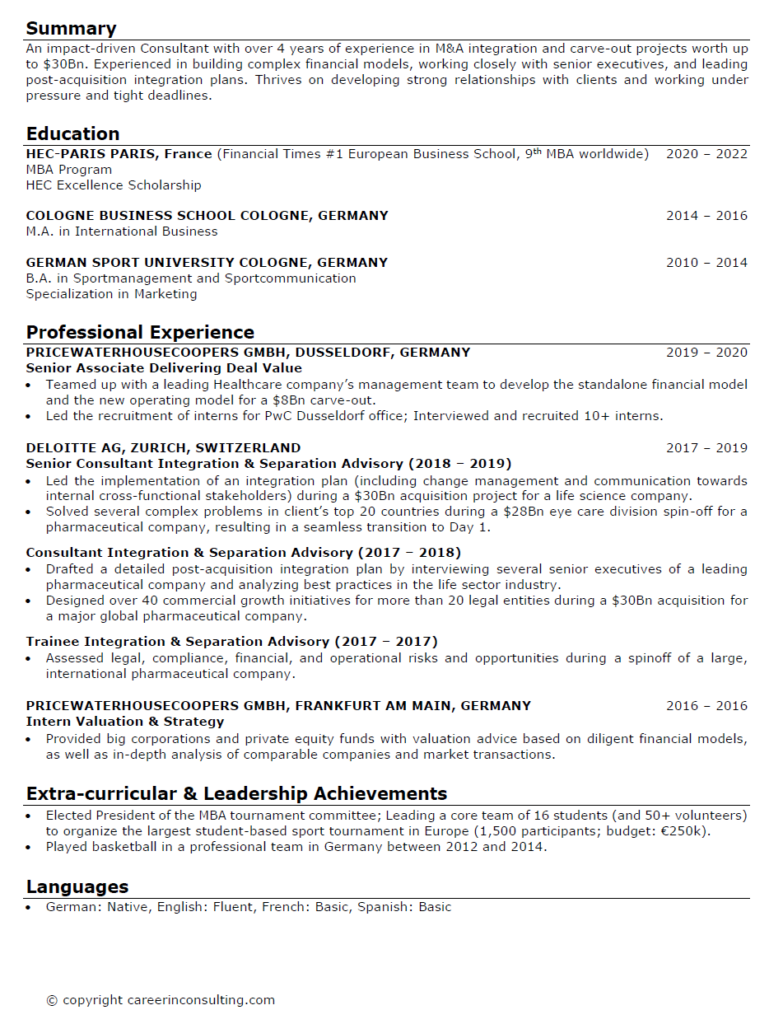
PhD consulting resume example
After a few years of working on their thesis, a PhD candidate can feel that academia is not for them.
I’ve worked with several PhD candidates willing to (re)start their careers by joining a top consulting firm.
Here is a MhD consulting resume example that worked.
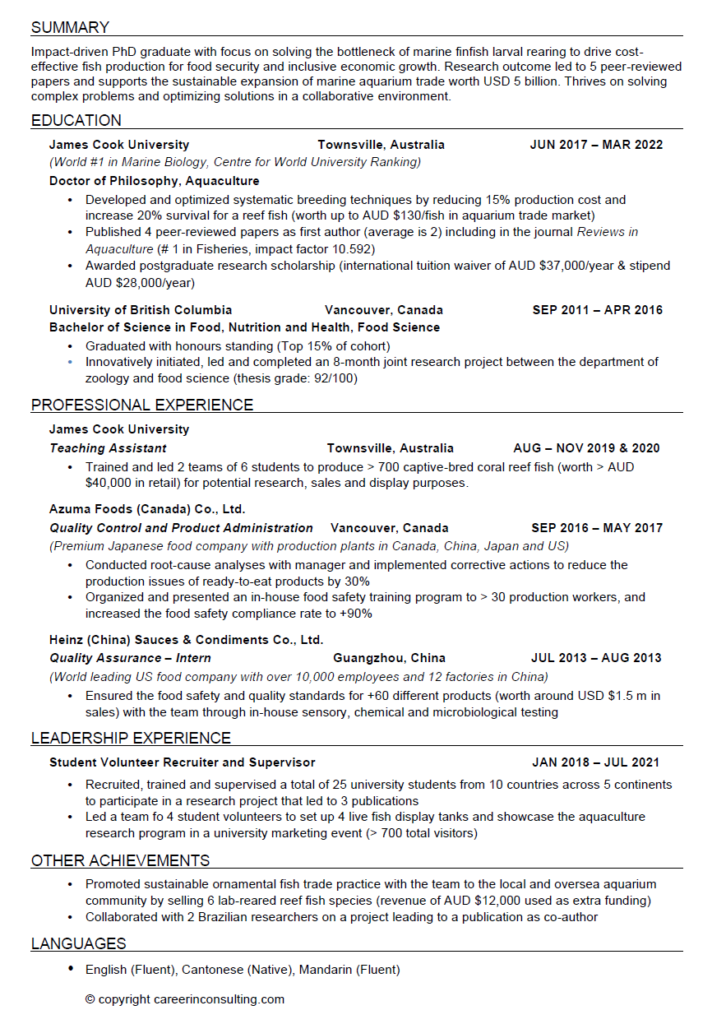
Experienced professional consulting resume example
After a few years, some experienced professionals might feel not challenged enough.
These professionals?
They don’t like the routine in their jobs anymore.
Hence, here is the turn to a career in consulting.
Next, a consulting resume example of an experienced professional.
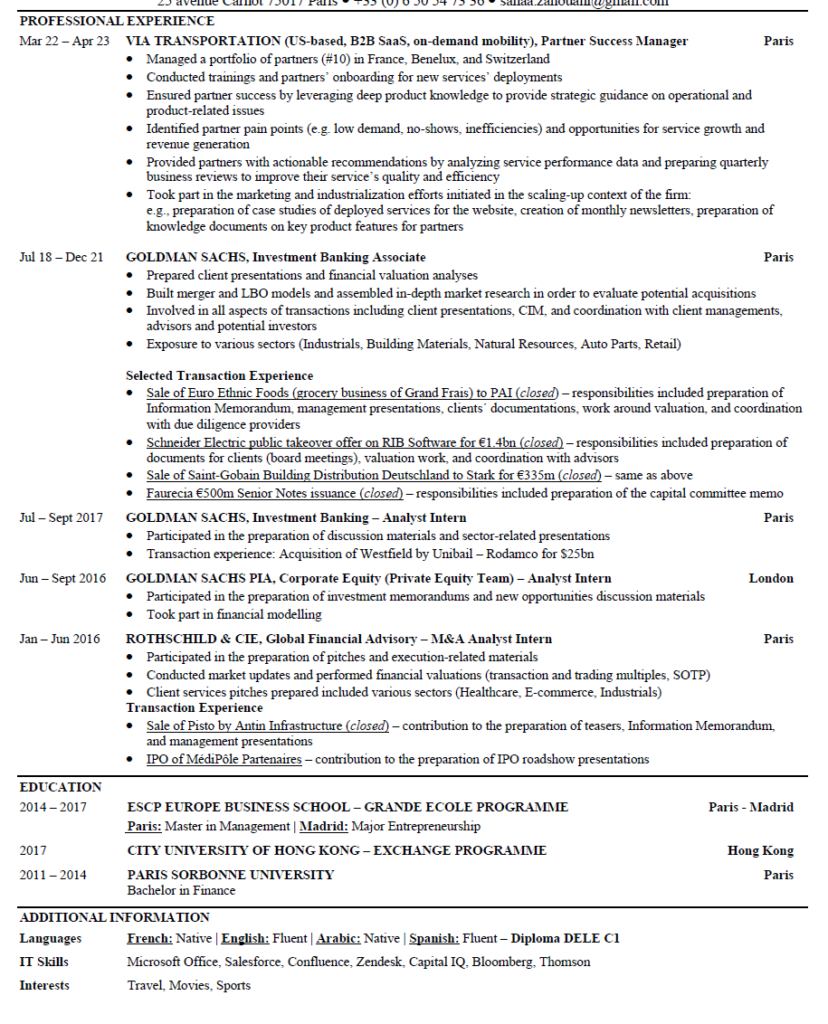
Bonus: Firmlearning's McKinsey CV
Besides, you can watch this video from the YouTube channel Firm Learning (hosted by a former McKinsey consultant):
Attention: you can find hundreds of consulting resume examples online.
But you should never copy/paste sentences from those consulting resume examples!
Instead:
You must understand the principles of a winning consulting resume.
And how to apply those principles to your management consultant resume.
Consulting resume templates
Do not reinvent the wheel.
Thus, you can download free Word or PDF templates to fasten the writing process.
These are detailed templates that will help you outline your resume correctly.
You can use these templates to apply to any top-tier consulting firms, including the following:
- McKinsey
- BCG
- Bain & Company
- Oliver Wyman
- Roland Berger
- Kearney
- LEK
- OC&C
- Deloitte Monitor
- Strategy&
- PWC
- E&Y Parthenon
- And many more.
If you need help writing your resume, these templates will help you.
Here is the Word template.
And here is the PDF template.
Besides, check this article to download consulting cover letter templates and examples.
A consulting resume review
In this video, I’ll review the resume of Yash.
Yash is currently an MBA student, and he is planning to apply to McKinsey later this year.
We decided to go through his McKinsey resume.
I gave him feedback on what was good and how to improve the parts of his resume that didn’t work.
For instance, we discussed how to show his impact on his previous experiences better.
The cool thing about this is that you can use this feedback to improve your management consulting resume and pass the screening phases.
Enjoy the video!
Consulting resume: the ultimate checklist
Writing (or polishing) a resume that passes the screening phase is difficult.
And this guide comes with a lot of strategies and techniques.
Thus, to help you finalize your resume, I’ve prepared a checklist for you.
You can access this checklist by clicking on this link.
Then, you’ll see a Google spreadsheet that you can download.
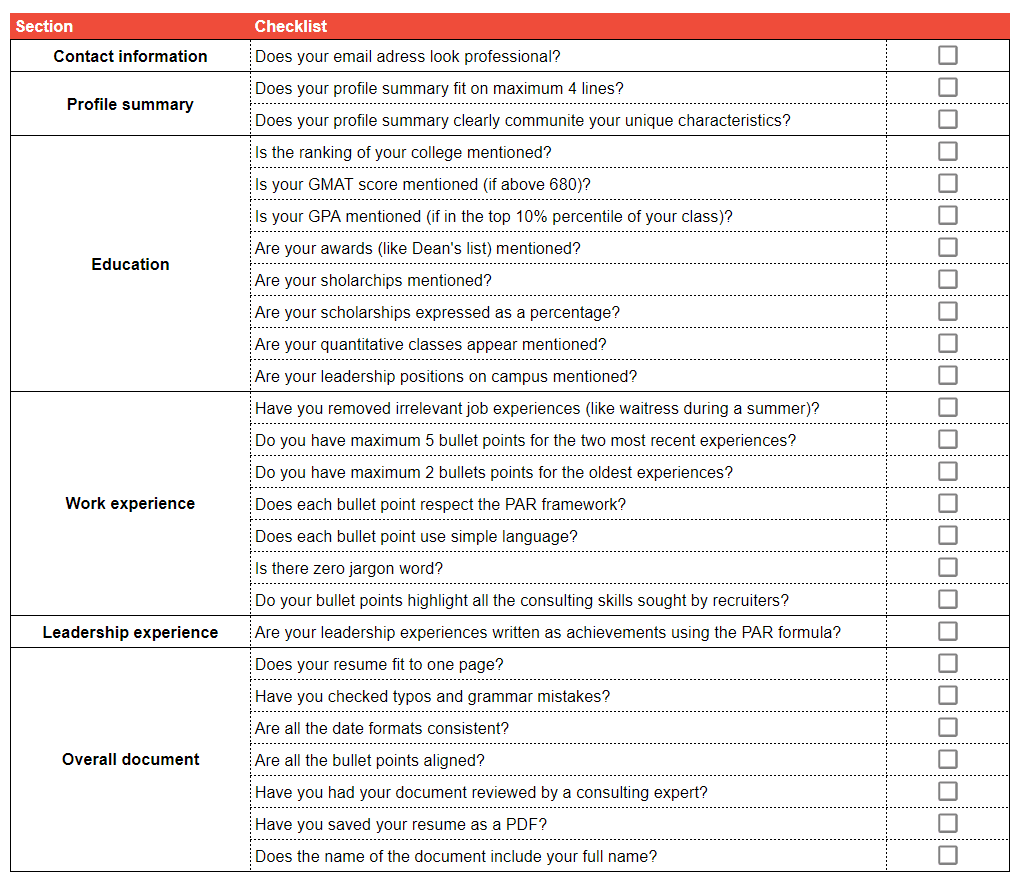
I use this checklist to help my clients write winning consulting resumes and secure interviews.
Frequently asked questions
Can I submit a 2-page resume?
Never!
Being able to prioritize information is key in consulting.
And it starts with the information you show on your management consulting resume.
Thus, consulting resumes must be 1-page resumes.
Always!
Should I include a company description?
Some people include a brief description of each company directly under the employment information, but I think it’s best to leave this off.
If you’ve caught a recruiter’s attention and haven’t heard of a company listed in your experience, they’ll do their own research and look it up on Google or LinkedIn.
And if the company is well-known, including a description of what they do will insult their intelligence.
Your accomplishments will primarily be what matter most to a recruiter, not where you achieved them.
Use that space for your results bullets instead!
Do I need a consulting experience on my resume?
No.
You don’t need experience in consulting to land a job in consulting.
Instead:
Show your transferable skills in your management consulting resume.
What’s different in a consulting internship resume?
There is no difference between a consulting internship resume and a full-time consulting resume.
Should I include all my education history?
Do not include high-school diplomas.
Instead: includes your Bachelor and Master’ degrees.
Should I submit a different consulting firm resume?
No.
Write one perfect management consulting resume, and you’ll be good 🙂
Even the consultant resume summary section must be the same.
What can I do if I can’t quantify my achievements?
These are very common questions among job seekers.
Let’s see how to answer those questions based on 3 different situations.
First situation: your contribution can be quantified, but you don’t have the number.
Unless you were actively keeping track of your results at your job, you probably don’t know how much impact, exactly, did your work have.
The first solution is to ask your previous employers for the data.
They should be more than happy to send it over!
Another solution is to estimate the results by yourself (like doing a market sizing question).
And that’s ok to put a rough estimate in your resume.
It shows that you are comfortable with numbers, and that’s great for consulting jobs!
But never lie in your resume or during job interviews.
Don’t say, “I increased sales by $15m,” if you know that the order of magnitude is not true.
Second situation: your contribution can’t be quantified, but the resources used to solve the problem can be.
If you can’t quantify the result, give a perspective on the scale of the problem by quantifying the resources involved.
For instance:
How many people did you manage/work with? E.g., “Managed a team of 5 software engineers to develop software solutions for clients.” or “Worked with a team of 6 to create award-winning ad campaigns for Company X.”
What was the budget? E.g., “Successfully carried out X marketing campaign, going under the designated budget of Y USD.”
How many clients/customers did you work with? E.g., “Managed marketing campaigns of 5+ SaaS clients in the fin-tech and HR-tech industries.”
Third situation: you can’t quantify your result or the resources needed to solve the problem.
My first question is: are you sure?
If yes, don’t put a number.
Yet, try to put your achievements into perspective.
For instance:
Supervised a team diversity initiative which led to a complete overhaul of the company’s hiring process
Created customer support strategy, which received approval from C-level executives
Introduced a product development framework now used by the engineering team across the company
How can I choose my achievements if I’m still a student?
If you’re a student or a recent graduate, you probably don’t have that much work experience
Yet, you can list achievements from:
- Internships
- School projects, for instance: I created a marketing strategy for Company X as part of my Marketing 101 class.
- University club activities, for instance: led the consulting club at XXX University
- Volunteering Experience, for instance: taught kids elementary mathematics as a volunteer at XXX’s orphanage.
Should I include a career objective section?
Your consulting resume should not include a “consultant resume objective” section.
Consulting firms know your career objective: land a job in Consulting!
So, let me repeat:
Your management consulting resume should not include a “career objective” section!
However, your cover letter can address why you want to pursue a career in consulting.
Should I include a skills section in a consulting resume?
Never!
Your management consulting resume has one objective:
Show that you can become a successful management consultant!
Consulting firms know what skills you must have (see the above section) to become a successful management consultant.
Putting other skills on your consulting resume tells them you haven’t understood their expectations.
Consulting resume: final words
I hope you have enjoyed this updated guide for writing consulting resumes that work in 2023.
Now, I’d like to hear from you:
Which tips from today’s guide will you use first to write your management consulting resume?
Are you going to rewrite bullet points?
Or start with the Education section of your management consulting resume?
Let me know by leaving a quick comment below right now.
Get 4 Complete Case Interview Courses For Free

You need 4 skills to be successful in all case interviews: Case Structuring, Case Leadership, Case Analytics, and Communication. Join this free training and learn how to ace ANY case questions.
P.S. Are you looking for help?
If you want a team of experts by your side throughout the entire consulting recruitment process, check if we would be a good fit by clicking here.
We’d be thrilled to help you secure a job in the top consulting firm of your dreams!
Related articles:
How to answer the question “Why consulting” and “Why McKinsey? Why BCG? Why Bain & Company?”.
Also: read this article to write a compelling and personalized cover letter.
SHARE THIS POST

Pingback: How To Write A Persuasive And Customized Consulting Cover Letter - Career in Consulting
Pingback: All About The McKinsey Recruitment Process - Career in Consulting
Pingback: What Does A Management Consultant Do? - Career in Consulting
Pingback: All About The BCG Recruitment Process - Career in Consulting
Pingback: All About Bain Recruitment Process - Career in Consulting
You mentioned to “sign up” to get the 100+ achievement examples by email, but I’m not seeing anywhere to sign up or anything to sign up for.
The list of examples has been removed for now.